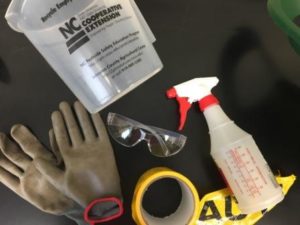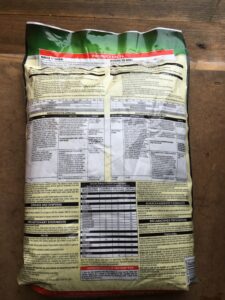February Is National Pesticide Safety Month!
go.ncsu.edu/readext?773506
en Español / em Português
El inglés es el idioma de control de esta página. En la medida en que haya algún conflicto entre la traducción al inglés y la traducción, el inglés prevalece.
Al hacer clic en el enlace de traducción se activa un servicio de traducción gratuito para convertir la página al español. Al igual que con cualquier traducción por Internet, la conversión no es sensible al contexto y puede que no traduzca el texto en su significado original. NC State Extension no garantiza la exactitud del texto traducido. Por favor, tenga en cuenta que algunas aplicaciones y/o servicios pueden no funcionar como se espera cuando se traducen.
Português
Inglês é o idioma de controle desta página. Na medida que haja algum conflito entre o texto original em Inglês e a tradução, o Inglês prevalece.
Ao clicar no link de tradução, um serviço gratuito de tradução será ativado para converter a página para o Português. Como em qualquer tradução pela internet, a conversão não é sensivel ao contexto e pode não ocorrer a tradução para o significado orginal. O serviço de Extensão da Carolina do Norte (NC State Extension) não garante a exatidão do texto traduzido. Por favor, observe que algumas funções ou serviços podem não funcionar como esperado após a tradução.
English
English is the controlling language of this page. To the extent there is any conflict between the English text and the translation, English controls.
Clicking on the translation link activates a free translation service to convert the page to Spanish. As with any Internet translation, the conversion is not context-sensitive and may not translate the text to its original meaning. NC State Extension does not guarantee the accuracy of the translated text. Please note that some applications and/or services may not function as expected when translated.
Collapse ▲February is National Pesticide Safety Month! So, we want to share some tips to help keep our community safe.
For any pesticide, the label is the law! Make sure you read and follow all label instructions. The label will give information including how and where you can use the pesticide, what personal protective equipment (PPE) you should wear when handling the pesticide, and more.

Personal protective equipment (PPE), such as gloves and goggles, protects the person handling the pesticide.
In North Carolina, the N.C. Department of Agriculture and Consumer Services (NCDA&CS) is the organization responsible for enforcing pesticide regulations. NCDA&CS administers pesticide exams and licenses. Licensed pesticide applicators can usually get pesticide education, including continuing education credits, through their local Extension office. All of these educational credits are approved by the NCDA&CS.
Safely disposing of pesticides is important for keeping people safe and protecting the environment. The 3RC EnviroStation offers pesticide disposal for Forsyth County residents. Be sure to check their website for information on their hours of operation and what materials they accept.

The pesticide label is the law and includes important information about safely using the product.
For even more information on pesticide safety, visit the following links:
Pesticide Environmental Stewardship: Some Basic Safety Principles




